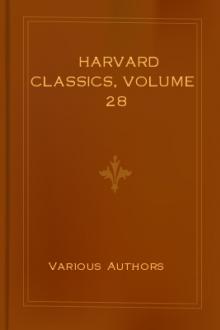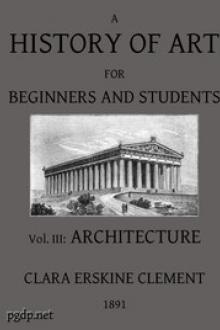Chronicle and Romance, - [ready to read books .TXT] 📗

- Author: -
- Performer: -
Book online «Chronicle and Romance, - [ready to read books .TXT] 📗». Author -
As concerning bees, I think it good to remember that, whereas some ancient writers affirm it to be a commodity wanting in our island, it is now found to be nothing so. In old times peradventure we had none indeed; but in my days there is such plenty of them in manner everywhere that in some uplandish towns there are one hundred or two hundred hives of them, although the said hives are not so huge as those of the east country, but far less, and not able to contain above one bushel of corn or five pecks at the most. Pliny (a man that of set purpose delighteth to write of wonders), speaking of honey, noteth that in the north regions the hives in his time were of such quantity that some one comb contained eight foot in length, and yet (as it should seem) he speaketh not of the greatest. For in Podolia, which is now subject to the King of Poland, their hives are so great, and combs so abundant, that huge boars, overturning and falling into them, are drowned in the honey before they can recover and find the means to come out.
Our honey also is taken and reputed to be the best, because it is harder, better wrought, and cleanlier vesselled up, than that which cometh from beyond the sea, where they stamp and strain their combs, bees, and young blowings altogether into the stuff, as I have been informed. In use also of medicine our physicians and apothecaries eschew the foreign, especially that of Spain and Pontus, by reason of a venomous quality naturally planted in the same, as some write, and choose the home-made: not only by reason of our soil (which hath no less plenty of wild thyme growing therein than in Sicilia and about Athens, and maketh the best stuff) as also for that it breedeth (being gotten in harvest time) less choler, and which is oftentimes (as I have seen by experience) so white as sugar, and corned as if it were salt. Our hives are made commonly of rye straw and wattled about with bramble quarters; but some make the same of wicker, and cast them over with clay. We cherish none in trees, but set our hives somewhere on the warmest side of the house, providing that they may stand dry and without danger both of the mouse and the moth. This furthermore is to be noted, that whereas in vessels of oil that which is nearest the top is counted the finest and of wine that in the middest, so of honey the best which is heaviest and moistest is always next the bottom, and evermore casteth and driveth his dregs upward toward the very top, contrary to the nature of other liquid substances, whose grounds and leeze do generally settle downwards. And thus much as by the way of our bees and English honey.
As for the whole-bodied, as the cantharides, and such venomous creatures of the same kind, to be abundantly found in other countries, we hear not of them: yet have we beetles, horseflies, turdbugs or dors (called in Latin scarabei), the locust or the grasshopper (which to me do seem to be one thing, as I will anon declare), and such like, whereof let other intreat that make an exercise in catching of flies, but a far greater sport in offering them to spiders, as did Domitian sometime, and another prince yet living who delighted so much to see the jolly combats betwixt a stout fly and an old spider that divers men have had great rewards given them for their painful provision of flies made only for this purpose. Some parasites also, in the time of the aforesaid emperor (when they were disposed to laugh at his folly, and yet would seem in appearance to gratify his fantastical head with some shew of dutiful demeanour), could devise to set their lord on work by letting a flesh fly privily into his chamber, which he forthwith would eagerly have hunted (all other business set apart) and never ceased till he had caught her into his fingers, wherewith arose the proverb, "Ne musca quidem" uttered first by Vibius Priscus, who being asked whether anybody was with Domitian, answered "Ne musca quidem" whereby he noted his folly. There are some cockscombs here and there in England, learning it abroad as men transregionate, which make account also of this pastime, as of a notable matter, telling what a sight is seen between them, if either of them be lusty and courageous in his kind. One also hath made a book of the spider and the fly, wherein he dealeth so profoundly, and beyond all measure of skill that neither he himself that made it nor any one that readeth it can reach unto the meaning thereof. But if those jolly fellows, instead of the straw that they must thrust into the fly's tail (a great injury no doubt to such a noble champion), would bestow the cost to set a fool's cap upon their own heads, then might they with more security and less reprehension behold these notable battles.
Now, as concerning the locust, I am led by divers of my country, who (as they say) were either in Germany, Italy, or Pannonia, 1542, when those nations were greatly annoyed with that kind of fly, and affirm very constantly that they saw none other creature than the grasshopper during the time of that annoyance, which was said to come to them from the Meotides. In most of our translations also of the Bible the word locusta is Englished a grasshopper, and thereunto (Leviticus xi.) it is reputed among the clean food, otherwise John the Baptist would never have lived with them in the wilderness. In Barbary, Numidia, and sundry other places of Africa, as they have been,[147] so are they eaten to this day powdered in barrels, and therefore the people of those parts are called Acedophagi: nevertheless they shorten the life of the eaters, by the production at the last of an irksome and filthy disease. In India they are three foot long, in Ethiopia much shorter, but in England seldom above an inch. As for the cricket, called in Latin cicada, he hath some likelihood, but not very great, with the grasshopper, and therefore he is not to be brought in as an umpire in this case. Finally, Matthiolus and so many as describe the locust do set down none other form than that of our grasshopper, which maketh me so much the more to rest upon my former imagination, which is that the locust and the grasshopper are one.
CHAPTER XV
OF OUR ENGLISH DOGS AND THEIR QUALITIES
[1577, Book III., Chapter 13; 1587, Book III., Chapter 7.]
There is no country that may (as I take it) compare with ours in number, excellency, and diversity of dogs.
The first sort therefore he divideth either into such as rouse the beast, and continue the chase, or springeth the bird, and bewrayeth her flight by pursuit. And as these are commonly called spaniels, so the other are named hounds, whereof he maketh eight sorts, of which the foremost excelleth in perfect smelling, the second in quick espying, the third in swiftness and quickness, the fourth in smelling and nimbleness, etc., and the last in subtlety and deceitfulness. These (saith Strabo) are most apt for game, and called Sagaces by a general name, not only because of their skill in hunting, but also for that they know their own and the names of their fellows most exactly. For if the hunter see any one to follow skilfully, and with likelihood of good success, he biddeth the rest to hark and follow such a dog, and they eftsoones obey so soon as they hear his name. The first kind of these are often called harriers, whose game is the fox, the hare, the wolf (if we had any), hart, buck, badger, otter, polecat, lopstart, weasel, conie, etc.: the second height a terrier and it hunteth the badger and grey only: the third a bloodhound, whose office is to follow the fierce, and now and then to pursue a thief or beast by his dry foot: the fourth height a gazehound, who hunteth by the eye: the fifth a greyhound, cherished for his strength and swiftness and stature, commended by Bratius in his De Venatione, and not unremembered by Hercules Stroza in a like treatise, and above all other those of Britain, where he saith: "Magna spectandi mole Britanni;" also by Nemesianus, libro Cynegeticón, where he saith: "Divisa Britannia mittit Veloces nostrique orbis venatibus aptos," of which sort also some be smooth, of sundry colours, and some shake-haired: the sixth a liemer, that excelleth in smelling and swift-running: the seventh a tumbler: and the eighth a thief whose offices (I mean of the latter two) incline only to deceit, wherein they are oft so skilful that few men would think so mischievous a wit to remain in such silly creatures. Having made this enumeration of dogs which are apt for the chase and hunting, he cometh next to such as serve the falcons in their time, whereof he maketh also two sorts. One that findeth his game on the land, another that putteth up such fowl as keepeth in the water: and of these this is commonly most usual for the net or train, the other for the hawk, as he doth shew at large. Of the first he saith that they have no peculiar names assigned to them severally, but each of them is called after the bird which by natural appointment he is alloted to hunt or serve, for which consideration some be named dogs for the pheasant, some for the falcon, and some for the partridge. Howbeit the common name for all is spaniel (saith he), and thereupon alluded as if these kinds of dogs had been brought hither out of Spain. In like sort we have of water spaniels in their kind. The third sort of dogs of the gentle kind is the spaniel gentle, or comforter, or (as the common term is) the fistinghound, and those are called Melitei, of the Island Malta, from whence they were brought hither. These are little and pretty, proper and fine, and sought out far and near to falsify the nice delicacy of dainty





Comments (0)